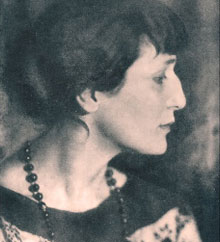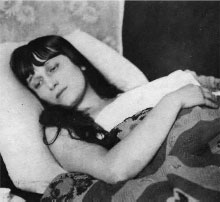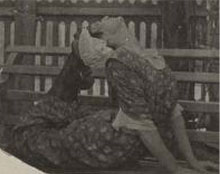POCKET POETS ANNA AKHMATOVA Biography & Authors Voice
Anna Akhmatova's poetry is characterised by its controlled intensity. As an Acmeist her early poetry rejected Romantic subjectivity and numinous Symbolist vagueness for the objective clarity, concision and classic formality of the French Parnassian school.
Her early work was popular because it was simple and passionate, treating of love in all its forms, from longing and fulfilment to despair and disdain. For an English reader it is comparable to Yeats's love lyrics, sharing their variety and emotional immediacy.
With Stalin's Terror Akhmatova's characteristic combination of strong feeling and formal restraint became a powerful vehicle for the literally unspeakable horrors of her time. In these years, like Pasternak, she published no poetry. In that enforced silence, the regular rhyming stanzas and terse force typical of her work became a practical advantage. Her poems were composed and committed to memory. They were created, and survived, by heart. Nothing was left on paper. 'It was like a ritual,' her friend Lydia Chukovskaya recalled. To escape surveillance since her flat was bugged, the latest poem would be scribbled down for friends, silently read, and immediately burned. 'Hands, matches, an ashtray. A beautiful, bitter ritual.'
Akhmatova's poetry is most memorable in her brief funereal sequence, Requiem, dedicated to those lost in Stalin's Purges, and those grieving them. Here she is, reading its second and third sections. The strong rhythmic beat of section II is typical of her delivery, but common to Russian verse declamation in general in the twentieth century.
POCKET POETS ANNA AKHMATOVA Chronology
| 1889 | Anna Andreyevna Grigorenko was born near Odessa. Both sides of the family came from the Russian nobility. Before the age of one her parents moved to Tsarskoye Selo, near St Petersburg. |
| 1900 | She began writing poetry. None of her juvenilia survives. |
| 1905 | Her parents separated. She met the young poet, Nikolai Gumilev, who encouraged her to write. |
| 1906-10 | She moved to Kiev, completed her schooling in 1907, and transferred to Kiev University to study law. |
| 1907 | She published her first poem in Gumilev's short-lived journal, Sirius, signing it Anna G. Her father, a civil servant, did not want her to use the family name. |
| 1910 | She settled in St Petersburg and married Gumilev, who had courted her for five years. They spent their honeymoon in Paris, where they met Modigliani. Together with Osip Mandelstam, Gumilev and Anna created the Acmeist school of poetry. |
| 1910-12 | While Gumilev visited Abyssinia, Anna returned to Paris where Modigliani made a number of nude studies of her. She travelled in Italy. |
| 1911 | She adopted the Tatar name of her maternal great-grandmother, Akhmatova. |
| 1912 | Her first volume of poems, Evening, was published and made her reputation as an important new voice. Lev, her son by Gumilev, was born. He was brought up mainly by Gumilev's mother. |
| 1914 | Akhmatova's second volume, Rosary was published. It was a popular success, serving as a model for other aspirant women writers. In August Germany declared war on Russia. |
| 1914-17 | Akhmatova began a relationship with Boris Anrep, a poet and mosaic artist from St Petersburg. Anrep had left England, where he was part of the Bloomsbury Group, to fight as an officer in the Russian Army. Gumilev was fighting in an elite cavalry regiment, winning two medals for bravery. |
| 1917 | Akhmatova's third volume, White Flock, was published. In February the Russian Revolution began in St Petersburg. Anrep fled to England; Akhmatova chose to stay in Russia. |
| 1918-21 | Akhmatova divorced Gumilev and married Vladimir Shuleiko, a poet and Assyriologist. The marriage was a failure and was formally dissolved in 1926. Akhmatova had affairs with the theatre director Mikhail Zimmerman and the composer Arthur Lourié. |
| 1921 | Her fourth volume, Plantain, was published in April. In the summer she and Shuleiko separated; in August Gumilev was arrested and shot with 61 others for alleged participation in an anti-Bolshevik conspiracy. With his death the Acmeist school of poetry came to an end. Akhmatova's fifth volume Anno Domini MCMXXI was published in October. |
| 1922 | She became the wife, in all but name, of the Futurist art historian and critic Nikolai Punin. |
| 1923-41 | She began work on Pushkin. Attacks on her poetry for avoiding mandatory Marxist themes, and being introspective, bourgeois, and feminine, made it impossible for her to publish, though she continued to write. In the following years she earned a minimal living by translating Hugo, Tagore, Leopardi, the letters of Rubens, and writing critical works on Pushkin and Dostoevsky. |
| 1935 | Punin, and Akhmatova's son Lev, were both arrested in October, and released a week later, after Akhmatova appealed directly to Stalin. Subsequently Lev was banned from Leningrad University. |
| 1938 | Lev was re-arrested and condemned to five years in a penal labour camp for imputed counter-revolutionary activity on the basis of his parents' alleged anti-Bolshevism. Akhmatova and Punin separated. |
| 1938-40 | She wrote Requiem, a memorial to her lost son and the victims of Stalin's Terror. Many of her friends were exiled or died during Stalin's Purges. The poet Osip Mandelstam, fellow-Acmeist and former lover, died en route to a forced labour camp in 1938. The poets Esenin, Mayakovsky and Marina Tsvetayeva all committed suicide, in 1925, 1930 and 1941 respectively. Requiem was not published in Russia till the late 1980s, long after Akhmatova's death. In 1940 her sixth collection, From Six Books, was completed, printed, and pulped before its release. |
| 1941-5 | In June Germany invaded Russia. In September Akhmatova made a radio broadcast addressed to the women of Leningrad as the Germans began the blockade. She was evacuated to Tashkent, via Moscow and Chistopol, where she remained till May 1944, reading her poems to hospitalized soldiers and publishing a small collection of Selected Poems (1943). |
| 1943-5 | Her son Lev completed his term of penal labour and was sent into exile in Siberia. In 1944 he worked out his release by volunteering for service at the front. He fought in the Battle of Berlin and when the war ended he returned to Leningrad to complete his degree. |
| 1945 | She returned from evacuation in Tashkent, to Moscow. From 1940-1965 she worked on her long and difficult Modernist sequence, 'Poem Without a Hero'. |
| 1946 | After the war was won, widespread hopes that Stalin's repression would be relaxed were bitterly dashed by the new cultural purges initiated by Zhdanov's decrees. Akhmatova became the main literary victim of Zhdanov's attacks on the leading cultural figures of the time (including Shostakovich, Prokofiev and Eisenstein). She was labelled 'half-harlot, half nun', condemned for 'eroticism, mysticism, and political indifference', and expelled from the Union of Soviet Writers, so depriving her of a legitimate living. A small Leningrad edition of her poems was withdrawn from sale and officially destroyed. |
| 1949 | In August Punin was arrested and sent to a penal labour camp, where he died in 1953. In November Lev was re-arrested and condemned to 10 years in a Siberian labour camp. Akhmatova's later repudiated cycle of poems in praise of Stalin ('In Praise of Peace') did not help either of them. |
| 1951 | She was reinstated as a member of the Union of Soviet Writers. |
| 1953 | Stalin died. |
| 1956 | Lev was rehabilitated, released and returned to his studies in Leningrad. From the age of 26-44 he had spent most of his time in the Gulags. |
| 1958 | A large edition of 25,000 copies of her Poems was published. |
| 1960-6 | The fullest Soviet edition of her work, Poems 1909-1960, was published. It included works from five unpublished or pulped collections she had prepared in what she called 'the Vegetarian Years' (Reed, Uneven, From Six Books, Willow, Seventh Book). After the death of Boris Pasternak in 1960, Akhmatova was recognised as the greatest living Soviet poet. In 1962 she was nominated for the Nobel Prize in Literature. In 1965 a new collection, The Flight of Time, was published; she travelled to Sicily to receive the Taormina Prize, and to Oxford to receive an honorary D Litt. Her long poem, The Way of all the Earth, was published in 1965. She died after a heart attack, in 1966. |













